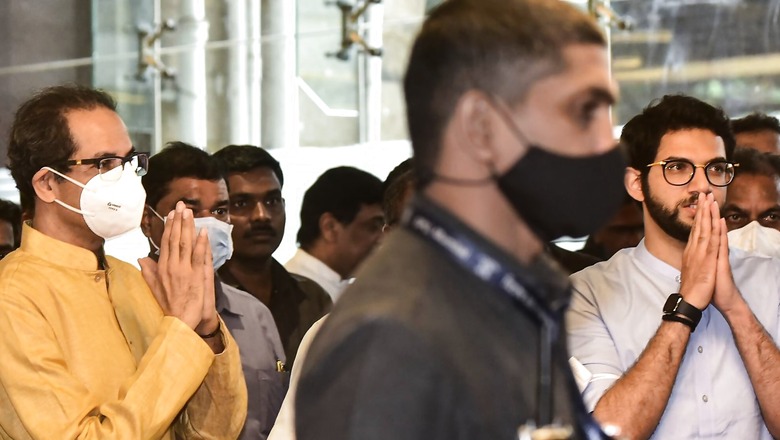
views
Ever since the now Maharashtra Chief Minister Eknath Shinde rebelled against Shiv Sena supremo’s son Uddhav Thackeray there has been loud talk of who the real Shiv Sena belongs to. Shinde pulled off an overnight coup, attracting over 40 MLAs from the Shiv Sena, which make a majority of a total of their 55.
Several Independents who would have otherwise given their support to the Maha Vikas Aghadi government also joined the Shinde camp, switching loyalties. If grapevine is to be believed, this magnum opus was orchestrated entirely by Devendra Fadnavis with no-holds-barred support from the top echelons of the Bharatiya Janata Party.
In 2019, when Uddhav Thackeray ditched the BJP to capture the Chief Minister’s seat, abandoning the alliance set-up and maintained by his father, the late Balasaheb Thackeray, it was clear that neither did Balasaheb’s legacy matter to him, nor his ideals.
What mattered was the money, the power and the lust to show the BJP down — and in this greed he allied with new friends, Sharad Pawar and Sonia Gandhi. Merely looking at the numbers, with Shiv Sena, NCP and Congress coming together, their strength in the Maharashtra Assembly was about 175 MLAs. The BJP, despite being the single largest party in the 2019 elections with 105 MLAs, was forced to be in Opposition.
If the BJP had to claim its rightful place, it would need 30 MLAs over its 105 to cross the half-way mark — a feat considered almost impossible. However, ever since the MVA was formed, Fadnavis time and again exuded confidence that this kind of unnatural alliance is bound to crumble due to friction within itself. And that is exactly what has happened in the last few weeks in Maharashtra.
Now that the Shinde-Fadnavis government has passed the floor test in the Assembly, proving its strength, it may be wise to introspect how and why such a near-impossible coup has been successful. It may also become pertinent to understand what these developments would mean for Indian politics in other states and on the national stage.
Dynastic parties have plagued Indian politics since Independence, due to the power-attracts-power and money-attracts-money philosophy. After gaining power, family-run parties like the Congress, NCP, RJD, Trinamool Congress Party, Telangana Rashtra Samithi and many more have essentially run the country like a family business, siphoning off wealth from state finances, finishing off any opposing forces using state machinery. It became a vicious cycle.
However, Shinde’s rebellion in Maharashtra may encourage many other deserving leaders in other dynastic parties to follow suit. The Congress, for instance, is on the brink of extinction — while we have seen the G23 group time and again raise the red flag, they haven’t had the courage or the power to pull off a rebellion big enough to overpower the Gandhis.
In Maharashtra itself, the fight for power within the NCP is often talked about — there is the Ajit Pawar camp, the Supriya Sule camp, the Jayant Patil camp, with notable friction between them to seize the party in Sharad Pawar’s absence. The obvious question that one may ask is: What happens next to the befallen leaders like Uddhav Thackeray — do they rise again or do they disappear into the shadows becoming mere non-entities?
The likely answer is the latter. While due to their last names, they may still attract crowds in rallies and enjoy some level of ground support from karyakartas loyal to the party supremos — a swollen crowd does not help form a government. Getting candidates elected does — something that doesn’t seem likely for Uddhav Thackeray to pull off anymore.
Besides, if there’s a long-drawn legal battle over the rightful ownership of the Shiv Sena, karyakartas are either bound to switch over to the Shinde camp that enjoys power or even look towards other parties to secure funds, growing impatient by the day.
Fadnavis’ generous act of playing kingmaker, while opting to sit out of the government, only to assume deputy chief ministership on the BJP top brass’ command is bound to have larger consequences not only in Maharashtra but in national politics.
The media innuendo is that Fadnavis was slighted by sections of the party high command even though he deserved to be chief minister — due to having the original people’s mandate and pulling down the MVA government. However, my view is that Fadnavis’ actions and its national consequences will be so significant in the long run that it may forever change the course of contemporary Indian politics in the next few election cycles to come.
In such a situation, it may not be possible to ignore the significance of his contributions. It is only a matter of time before other dynastic parties follow Maharashtra’s Shinde-Fadnavis model and deserving leaders rebel to take over their rightful place in party leadership.
The writer is a policy and communications strategist. ‘A Nation to Protect: Leading India Through the Covid Crisis’ is her third book. The views expressed in this article are those of the author and do not represent the stand of this publication.
Read all the Latest News, Breaking News, watch Top Videos and Live TV here.
















Comments
0 comment